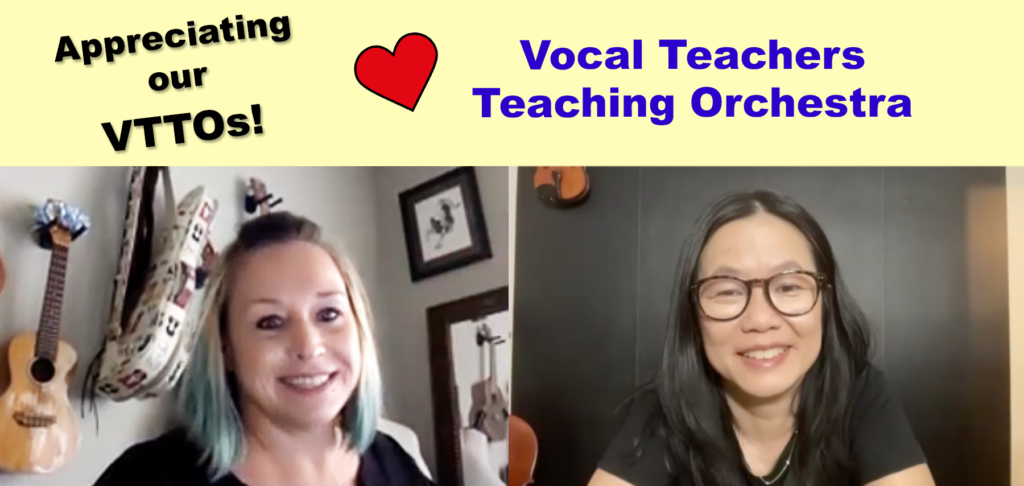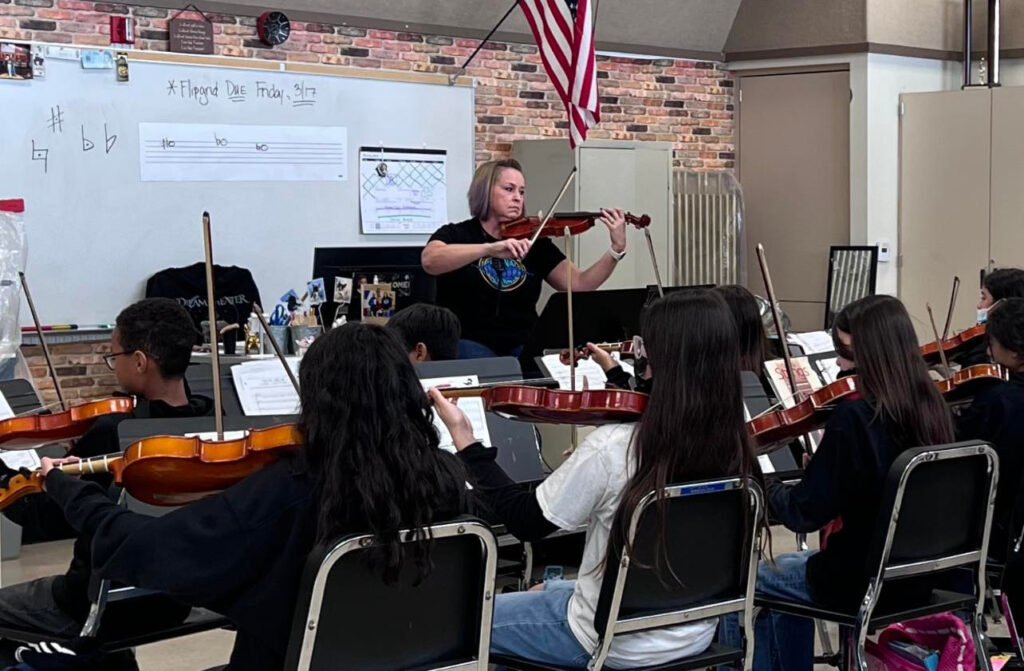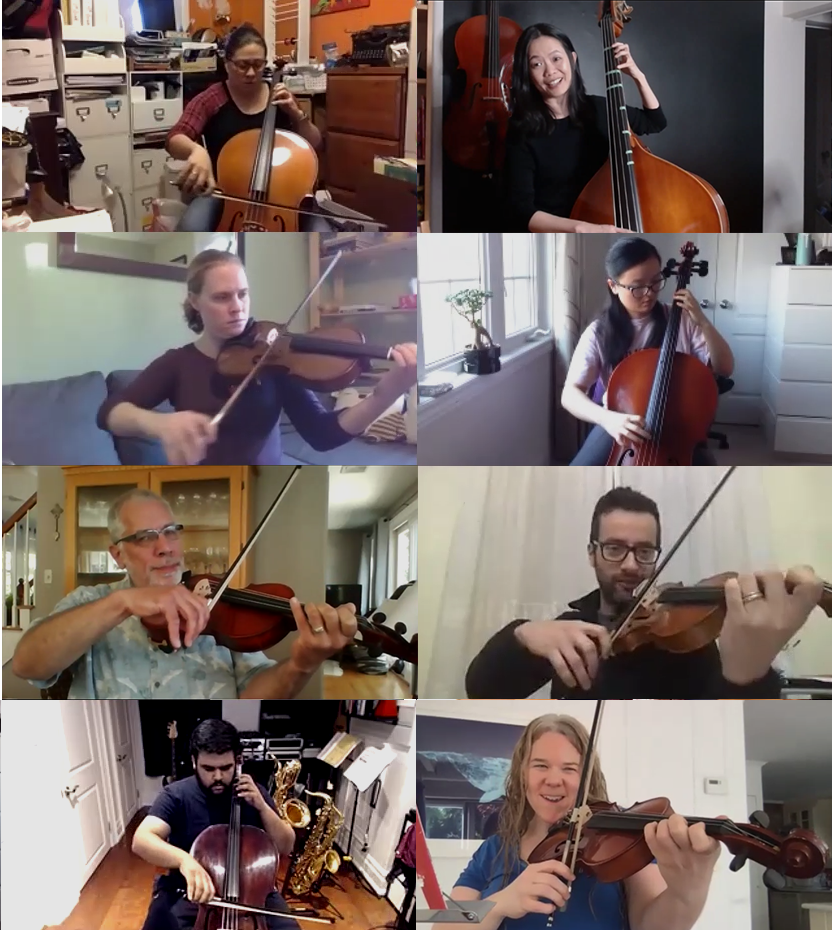An interview with Jennifer Stampfl for NSPTO Month 2023!

Today’s conversation is with Jennifer Stampfl, a vocal major in her first year of teaching middle school orchestra in Pomona, California.
Jennifer, what did you study in college and what was your area of focus?
I wanted to be a vocal teacher. I never wanted to teach instruments. Growing up I sang all my life, but when I also played the flute in junior high and high school. Then I went into percussion and I was on the high school drum line. I also played piano my whole life, so there were instruments there.
Then, when I got into college of course, being an education major we had to take one semester of each family of instruments. And when I did strings I did viola and it was just for one semester.
At the time I didn’t pay that much attention because that was not what I wanted to do. So , you know, I didn’t care about it. And I was terrible at it.
So when you say you took one semester on each family of instruments, that means you only got to learn to play one instrument out of each family?
Out of each family, yep. That’s all I got for instrumental. That’s all that was required as a music education major at the time.
I was at California State University Long Beach and they had a huge steel drum program. Because of my percussion background I did get very interested in that. And I have since formed a steel drum band that I also teach as well.
How long were you teaching vocal before you ended up with an orchestra program, and how did that come about?
So I’ve been teaching vocal, steel drums and private piano for 23 years. This is my first year teaching orchestra. I ended up with orchestra because I was kind of the extra teacher. Last year they wanted to move me to elementary to be an itinerant teacher and just teach general music, and give up my classroom and my program. The only way to stay where I was was to take on teaching both band and orchestra.
So is this the first time you’re teaching band as well?
Yes.
How many classes of strings do you have and what levels are you teaching?
I have two classes of strings, beginning sixth grade and then advanced seventh and eighth grades.
And before you found me, what were you doing to prepare for teaching orchestra? What was your plan?
Crying. [We laugh!]
I was prepared to hire a private teacher. I was looking at everything under the sun, YouTube, Google, Facebook. I’m not a person who fails at things, so I was pulling out all the stops, you know, whatever it took.
And what’s really funny is strings scared me way more than band. Maybe it’s because I’ve played the flute before and I’ve been in a band type situation. But now that I’m teaching it, strings is easy. Band is what scares me because a student will hold up their instrument and go, is my fingering correct? And I’m like, um, I dunno. What does your book say?
Yeah, so it’s a little more intimidating in band than strings. Strings is pretty logical as far as where you put your fingers and stuff like that. I mean, everything is just really logical, you know?
That could be because of you. You just made it really easy and clear to see the big picture.
I do get that a lot from band teachers after they’ve taken my course. They see that it can actually be a lot easier to teach strings than band.
So, what other PD resources were you looking into before you found me?
I found you pretty quickly, so I didn’t look into that many things. When I saw that you had the summer class that I sat down with my husband and I’m like, I really, really need to take this. The tuition was a lot for a teacher coming on the summer where we don’t get paid. In the end, luckily my district ended up reimbursing me, which was nice.
It was good. It was perfect. And I even told you at the end of the class, I wish there was a Grace for band, you know what I mean? Like, I wish there was a crash course that did the exact same thing to prepare me to teach band as well.
I’d like to take that on, simplifying band teaching, but in my next lifetime, ha, ha!
Any professional development I think that I would do immediately would be on the band side. For strings, just after taking your course and after you giving me the whole big picture, I really felt quietly confident going into it. I didn’t feel so intimidated. I didn’t feel so green.
I felt like, okay, I can look like I know what I’m doing, you know. And as I get in there and start implementing all these things that you taught us, then it’ll click. I’ll find my way. It was so nice not to have to go into this thinking, I have no idea what to do.
And your class that you did on taking the violin apart and putting it back together, that has really come in handy when kids come to me with problems.
Do you miss teaching vocal?
You know, teaching something new has kind of rejuvenated things. Like, this is fun, this is challenging. Every day is a new problem. Okay, let’s go fix it, let’s go figure it out. You know?
I found myself re-energized. I did.
I’m still doing a lot of singing, especially with band. With strings, I’m able to partly, but I mostly just play with them. I’m making myself play every single day with them so that I can get better. With band I don’t demonstrate so much because every instrument is just so different. So, I’m usually singing the part to them.
And with band, I’m using a lot of my vocal skills and my training with them. The breathing techniques are very similar, of course. And the phrasing too. It was easy to slide that into teaching band.
I’ve found out it’s trickier teaching phrasing to string players than to band players who are actually using their air. So, I am trying to teach my string players to imagine the rise fall of a sentence and then breathe the end of the sentence. But it’s not the same when they’re not actually having to do it with their air.
It’s hard cause there are so many mechanics involved. But they can do it. They can. And that’s really great that you are starting right away with that. It takes time to learn how to start beginners.
Now that you’ve had dipped your toes into teaching strings, what advice do you have for people who find themselves in a similar situation as you?
I think I mentioned our district is trying to implement violin to our fifth graders next year. So, we have two itinerant music teachers and my first suggestion to them was to reach out to you.
When you’re new and know nothing, it’s really hard to gather all those concepts out there about teaching strings and put them together and make sense of it. Here will be a concept on teaching rhythm to strings, and there will be a concept on teaching bow hold. But then you’re like, okay, but when do I teach this? When do I teach that?
So, taking your course and having you put it all together for me, it just really made it so much easier. It took a lot of brain work out of it for me, so I would definitely direct them to your class.
What else would you like to share with vocal majors teaching strings?
Being a vocal teacher, teaching solfege is very important for string players for ear training and for things like intonation awareness. So, a lot of my training as far as that has really helped with teaching strings as well.
I do find a lot of my vocal training has been helpful in teaching both band and strings. Vocal teachers can bring a lot of skills into teaching instruments.
But as far as helping string students, I think solfege is the biggest one. I mean, you recommended singing too. Sing it first. Hear it. And making sure that once you start putting your fingers on the instrument, that the pitch is matching what you’re singing.
So, you’ve found that as a vocal teacher, you still have a lot to offer a classroom full of instruments.
Yes. And it’s a lot more enjoyable than you might think at first.
That’s terrific, Jennifer! Thanks so much for your sharing your experience as a vocal teacher teaching strings. I hope it helps other VTTOs out there!





Leave a Reply